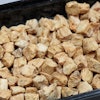A new study in ACS’ journal Environmental Science & Technology suggests that fish-flavored cat food could be among the culprits contributing to the higher number of cats diagnosed with hyperthyroidism.
Hyperthyroidism can cause weight loss, hyperactivity, aggression, vomiting and other symptoms in cats. There is no known cause for the condition, but some studies have suggested a connection between environmental pollutants including polychlorinated biphenyls (PCBs) and polybrominated diphenyl ethers (PBDEs), which have been banned in many countries because they could potentially harm humans.
Studies have detected these compounds and their byproducts in blood samples from cats, but they could have come naturally from other sources such as fish.
Researchers Hazuki Mizukawa, Kei Nomiyama and colleagues tested cat food and blood samples from cats. They also simulated how a feline’s body would process various PCB- and PBDE-related compounds. Based on their results, the team concluded that the byproducts that were detected at high levels in cats’ blood samples likely came from fish-flavored food and not exposure to PCBs or PBDEs. The researchers say further work is needed to clarify whether these metabolites specifically contribute to hyperthyroidism.
















